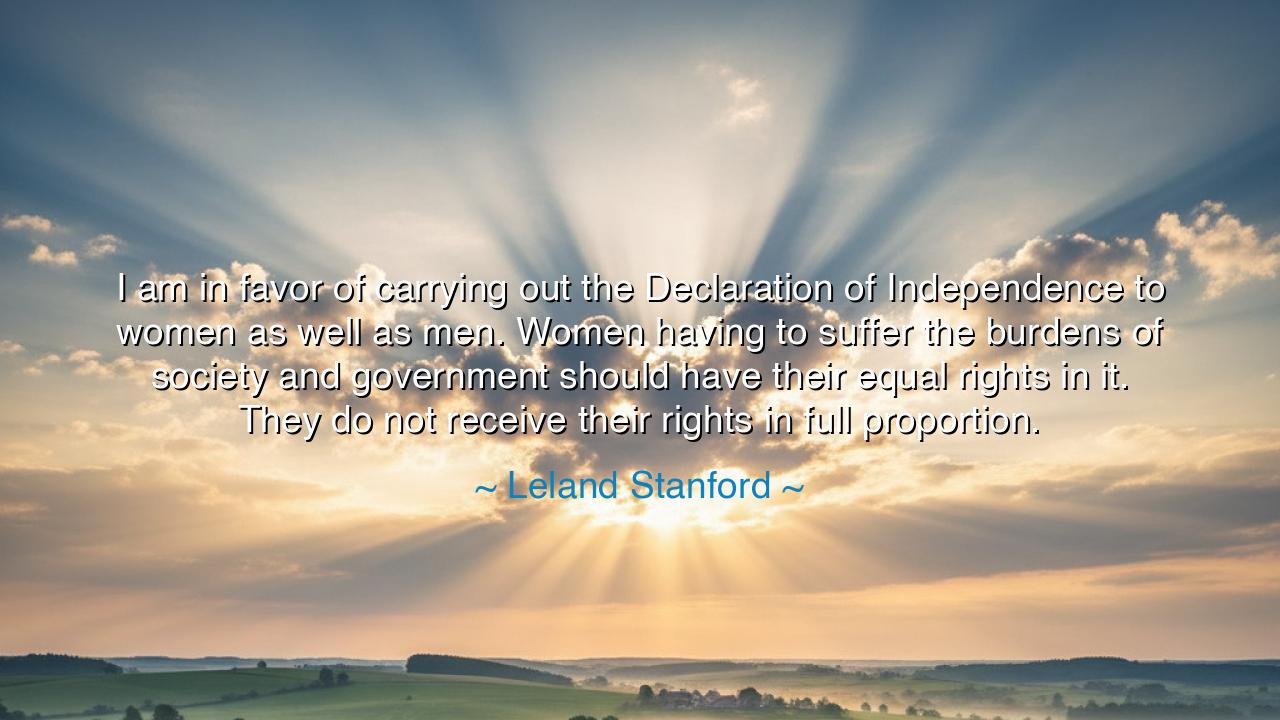
I am in favor of carrying out the Declaration of Independence to
I am in favor of carrying out the Declaration of Independence to women as well as men. Women having to suffer the burdens of society and government should have their equal rights in it. They do not receive their rights in full proportion.






Listen, O children of the future, to the words of Leland Stanford, whose voice rang with the wisdom of the ages when he said, "I am in favor of carrying out the Declaration of Independence to women as well as men. Women having to suffer the burdens of society and government should have their equal rights in it. They do not receive their rights in full proportion." These words strike at the heart of an age-old truth—that freedom is not a gift to be given selectively, but a right to be equally shared by all, regardless of gender. Let us understand the power in this statement and its implications for the future.
In the ancient world, the concept of freedom was often tied to the exclusion of certain groups. In Athens, the cradle of democracy, freedom was proclaimed as a birthright, but this freedom was granted only to a select few: the free men. Women, slaves, and foreigners were excluded from the full rights of citizenship. The noble ideals of equality and justice were applied only to those who fit the narrow mold of a citizen, and in this, the Athenian democracy fell short of its lofty goals. It was not until later civilizations, and the voices of philosophers like Socrates and Plato, that the seeds of true equality were sown, though even then, women remained outside the circle of full rights and freedom.
Leland Stanford’s words are a call to complete the vision of freedom first laid out in the Declaration of Independence—a call to bring the promise of equality to those who had been long denied it. Just as the American Revolution proclaimed that "all men are created equal," so too must this vision be extended to women, whose contributions to society and government have long been undervalued. Women, in every age, have borne the burdens of their families and communities, enduring hardships and struggles, yet they were denied the right to have a voice in the decisions that shaped their lives. Stanford’s plea echoes the call for justice, for equality, and for the recognition of the inherent worth of every human being, regardless of their gender.
Consider, O children, the story of Susan B. Anthony and Elizabeth Cady Stanton, two women who stood for women’s suffrage in a time when the rights of women were not even considered. They fought not just for the right to vote, but for the very equality that Stanford spoke of. They were told that their place was not in the political realm, that they were not suited to shape the laws that governed their lives. But Anthony and Stanton knew that true freedom could not exist as long as half of the population was silenced. Their struggle was long, and it was filled with adversity, but it was their resolve—their belief in equality—that carried them forward, until, in 1920, the 19th Amendment was passed, granting women the right to vote.
In Stanford’s words, we see a recognition of a truth that transcends time: the Declaration of Independence, with its promises of life, liberty, and the pursuit of happiness, was incomplete as long as women were excluded from its full scope. To suffer the burdens of society and government without the right to shape them through participation is to deny women their rightful place in the world. Their rights must not be treated as secondary, but as fundamental, for without this equality, the very ideals of the American Revolution are hollow and incomplete.
The lesson here, O children, is one of profound importance: freedom and equality are not mere ideals to be spoken of in lofty terms but principles that must be actively worked toward. Just as Stanford called for the extension of independence to women, so too must we work to ensure that the rights of all people—regardless of gender, race, or background—are fully realized. The struggles of the past, like those of Anthony and Stanton, are not just historical stories; they are living reminders that the battle for justice is never truly over. Each generation must carry forward the torch of equality, and each individual must play their part in shaping a world where every voice is heard.
So, O children of the future, let these words guide your path: carry out the Declaration of Independence to all, as Stanford urged. Stand for justice and equality not only for yourselves but for all who are denied the rights they deserve. Know that the true strength of any nation lies in its ability to offer freedom and equal rights to every citizen, and that in this, you will find the foundation for a just and prosperous world. The burdens of society and government must be shared by all, for it is in our collective freedom that we will find our greatest power.






AAdministratorAdministrator
Welcome, honored guests. Please leave a comment, we will respond soon